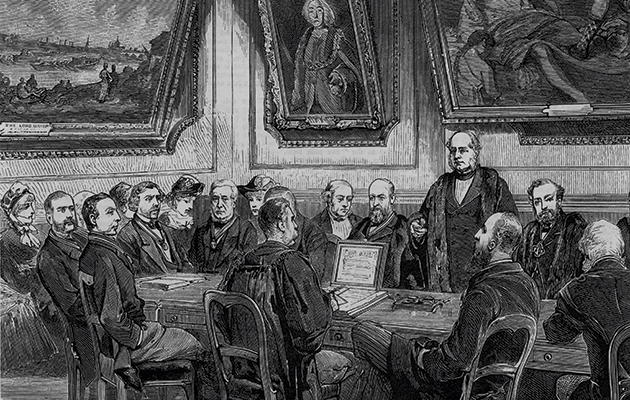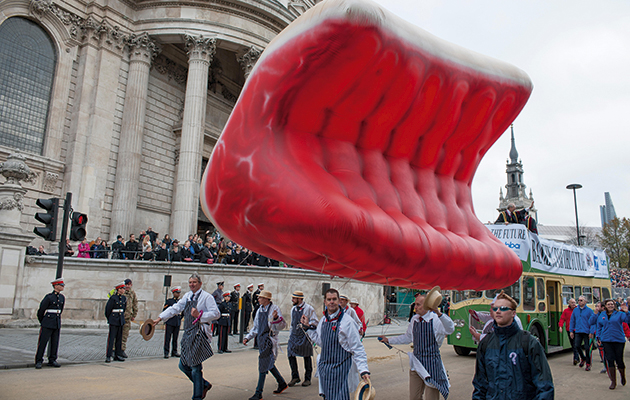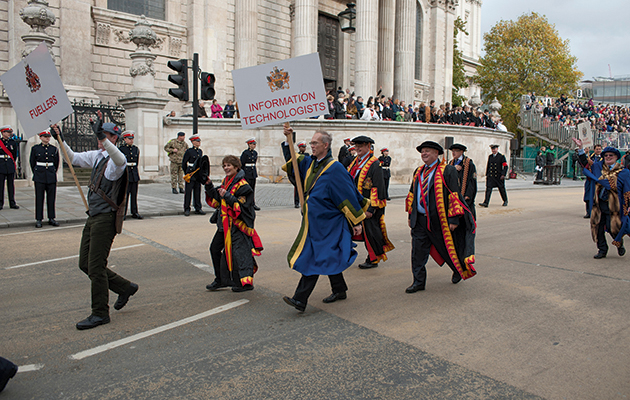While Rupert Bates doesn't long to drive sheep over London Bridge, he'd quite fancy the job of Ale Conner. The Field investigates the freemen of the city of London
The freemen of the city of London brings to mind strange rituals and odd handshakes. But, looking beyond the pomp, Rupert Bates investigates their rights and responsibilites, admires the freemen’s halls and celebrates the best job of all: Ale Conner.
Already familiar with the history of the freemen of the city of London? Read The history of the pheasant, or discover more about shooting with history of the shotgun and shooting.
FREEMEN OF THE CITY OF LONDON
Mention freemen and livery companies and apocryphal tales rain down on the City of London – dodgy handshakes, bizarre rituals, feasting on swans and the right to sell your wife to the Bishop of Bath and Wells
on his birthday.
The reality of the freemen of the city of London is a lot more prosaic. Well, most of it anyway. Amid the myths, freemen of the city of London and their rights and responsibilities do come with pomp and ceremony and a jolly good excuse to dress up and crack open a decent claret. Around 1,800 men and women a year become freemen of the City of London in ceremonies in the Chamberlain’s Court at Guildhall, with many presented by their livery company.

Henry Bessemer (1813-1893) English engineer inventor and industrialist, being presented with the freedom of Turner’s Company, a London livery company.
If you wanted to map the City of London’s social history you could do worse than study the evolution of freemen of the city of London – originally referring to those not the property of a feudal lord – over 800 years or so.
To become a liveryman you first need to be a freeman. Until about the mid 19th century you had to be a freeman to be allowed to trade in London’s Square Mile and if you failed to uphold the standards of your craft that freedom could be withdrawn. Your tools might be destroyed, your name blackened and you would not be allowed to work within a certain radius of the Square Mile, which is where some believe the term “sent to Coventry” comes from.
“It was a form of regulatory control and City governance and was the gatekeeper to riches. When someone is made a freeman, the Clerk of the Chamberlain’s Court says, ‘I give you joy.’ In other words, you can now make a fortune,” says Paul Jagger, court liveryman of the Worshipful Company of Information Technologists. Hang on. Information technologists? IT? The Worshipful Company of Fishmongers must be choking on their bones; the Loriners chomping at the bit.
THE NEW FREEMEN OF THE CITY OF LONDON
Do these upstart liverymen, presumably none of them over the age of 30, eat spam in dark basements while spreading viruses? Is there anything that grates more with tradition and slow-coach ceremony than the tyranny of IT and the fast-moving digital world?
“We are the 100th livery company, granted livery status in 1992 and the age of your craft has nothing to do with your status. The Worshipful Company of Educators, for example, is made up of a lot of Oxbridge academics, but only attained livery status last year,” says Jagger, who is the author of The City of London’s Freeman’s Guide. The Information Technologists are actually paired with Mercers, the livery ranked number one of the “Great 12”.
The placing was set 500 years ago. Age, wisdom, wealth – nobody is absolutely sure how the order of precedence came about – but it has certainly caused plenty of grief down the centuries. The row between the Skinners and Merchant Taylors as to which is six and which is seven has been diffused by rotating places on the pantheon each year – a dispute that is claimed to have given rise to the expression “at sixes and sevens”.
Another myth debunked is the idea that freemen of the city of London and their livery companies are all ancient and anachronistic, antiquated earls in ermine. After all, legend has it Dick Whittington started out with one cat and one item of hand luggage on a stick and went on thrice to become Lord Mayor of London – the ultimate honour for a freeman. “There is no expectation or requirement that you have to be privileged or from the right family. Actually as the economic influence has dropped, so the social cachet has risen,” says Jagger.
FREEMEN: PRESERVER OF STANDARDS
The institutions inhabited by freemen of the city of London may not move very fast – the description “with the speed of a striking slug” has been used – but they evolve and are engines of economic growth driving the occupations that lie under their coats of arms, preserving standards, while also great charitable benefactors.
Mercers and the Information Technologists, for example, co-funded the Hammersmith Academy, and many prestigious schools across the country – think Skinners in Kent, Haberdashers’ Aske’s in Hertfordshire and Oundle in Northamptonshire (Worshipful Company of Grocers) to name but three – have cause to thank the livery companies. Freemen of the city of London still have a “right of presentation” of their children to certain schools, although this does not necessarily mean they jump the queue. Freemen of the city of London status is hereditary, providing the child was born after the parent became a freeman.
The Guild of PR Practitioners is currently chasing livery status, or maybe it will simply merge with the Worshipful Company of Weavers, which has been spinning since 1130.
The closest I came to this liveried world was as guest speaker at a banquet held by the Worshipful Company of Broderers at the invitation of the Master.
I’m not sure why I was invited for, as a scribe for this great magazine I am clearly not one of the freemen of the city of London, remaining a vassal in servitude to a feudal lord. Having exhausted all my needle puns without having the broderers in stitches, a fellow next to me, who I suspect embroidered Boudica’s bedspread, said in a whisper that echoed round the hall, “Is there much more of this?” To be fair, the Broderer was only being true to the Master’s song, which starts, Oh, give us your plain dealing fellows, who never from honesty shrink, not thinking of all they shall tell us, but telling us all that they think.
THE POWERS AND PRIVILEGES OF FREEMEN
Many powers and privileges of freemen of the city of London and their liveries – the original trade unions – may have evaporated, but the Worshipful Company of Gunmakers, for instance, continues to test and approve all small-bore firearms before the gun is returned “lock, stock and barrel”.
Freemasons inhabit a similar environment. Plenty of freemen of the city of London are freemasons and most Lord Mayors of London down the years have been, too. But the idea of cults and sects is largely a media creation and the original reason that Masonic lodges were formed across the country was that masons, if there was a cathedral to build, had to travel to do their job, setting up guilds in the towns.
Freemen of the city of London were behind the concept of apprenticeships, with apprentices learning their trades and serving a master for seven years before unveiling their final piece of work – their “masterpiece” – and becoming a freeman.
There are myriad rights attached to being a freeman – a cocktail of the apocryphal, defunct, existing and soft. The right to carry a sword unsheathed and be drunk and disorderly in public – now that’s my sort of right – are often quoted. Liveries of yore were as tribal as football fans, with young apprentices, hoping to be freemen of the city of London, regularly fighting in the streets and causing tumult. The Lord Mayor’s Show was often the excuse for liberal libation and a bit of a tear up between liveries.

The Worshipful Company of Fishmongers dressed as fish ride Segways in The Lord Mayors Show procession.
Other rights, now defunct, are exemption from the press gang on the grounds their skills and competencies were needed elsewhere and no trial by combat. Perhaps the most important right in centuries past was that freemen of the city of London did not have to pay tolls for taking goods across London Bridge. This was a huge economic advantage when the bridge was the only entry point to the City and the perfect place to impose tax on incoming trade – for example sheep heading to Smithfield market.
Health, safety and traffic management mean a lot of form filling and permissions these days, however, this “right” is occasionally exercised and in September last year the Worshipful Company of Woolmen drove sheep across London Bridge for the second time in recent years. “It proved a bit of an administrative nightmare, but hopefully we have now simplified everything. It is really a relay of sheep and freemen across the bridge and a great way to keep an ancient tradition going and raise money for charity,” says Bill Clark, past Master of the Worshipful Company of Woolmen, a company that supports students of textiles and fashion design as well as sponsoring shearing competitions at agricultural shows.“It is a bit of fun, too, but also brings the country into the city and reminds people where food comes from. Taxes on wool helped build the city of London and fund wars,” adds Clark, whose company lost its hall in the Great Fire of London.
THE FREEMEN’S HALLS

Coat of arms of The Worshipful Company of Saddlers one of the ancient craft guilds and Livery companies of the City of London.
Ah, the halls. Some of the freemen of the city of London have halls lavish beyond the dreams of avarice and if you added up the City property assets of livery companies, Croesus would be green with envy, although their portfolios also include almshouses.
Freemen roam the country. In Newcastle you get to graze cattle on the moor, while neighbouring Durham was slow to emancipate, not allowing women to become freemen until four years ago.
Honorary freemanship is often conferred on heads of state and other luminaries. The late Nelson Mandela had quite a collection from various cities, while the actor Stephen Fry exercised his right by escorting Doris
the sheep (on a leash) across London Bridge, presumably in character as Blackadder’s General Melchett, shouting “baa!”
Other rights belonging to the freemen of the city of London include the ability to book lunch at Butcher’s Hall and, yes, there is a vegetarian option. But the reason I covet freeman status is the right to stand for election to “positions of trust in the City”, including Alderman, Sheriff and – wait for it – Ale Conner.
This is the dream job, requiring the Ale Conners in robes to test the quality of beer in the taverns. As well as tasting the latest brew, Ale Conners have to don leather trousers. The beer is then poured on to a wooden bench and the Conners sit down. If the breeches stick to the seat there is too much sugar in the ale.
News of a female Ale Conner carrying out the ancient ritual in the company of liverymen prompted Jagger to ask, “Where else in this great and famous City can gentlemen dressed in silk and fur gowns enjoy a drink in the company of a lady dressed in leather?” Don’t answer that.
There are plenty of myths, monsters and secrets peddled in this ceremonial world. Perhaps there is much I have not been told because I have not earned my freeman’s spurs.
Maybe there are, indeed, keys to the doors of a dungeon of cloaked devilry beneath Gresham Street. But all I have unearthed is networking nirvana; the perfect fusion of business and social and no shortage of largess. Dress up and drink on.










